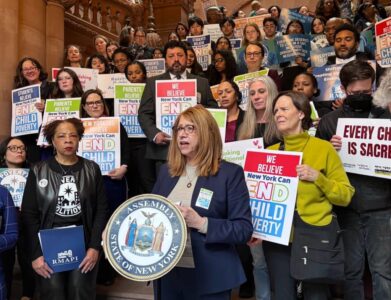Borrello Opposes Packaging Reduction Bill

State Sen. George Borrello, R-Sunset Bay, debates a plastics recycling bill on the floor of the state Senate last week.
State Sen. George Borrello, R-Sunset Bay, still hasn’t been swayed by a packaging reduction bill that has passed the state Senate for a second time.
S.1464 passed the Senate last week by a 33-25 vote. The Senate passed a similar version of the bill in 2024, but it didn’t make it through the state Assembly before the end of the legislative session. It’s uncertain if the Packaging Reduction and Recycling Infrastructure Act will meet the same fate with the legislative session scheduled to come to an end next week.
In addition to requiring less plastic in packaging materials, the legislation creates a packaging and single-use plastics extended producer responsibility program that would require companies using plastic to reduce the amount of plastic in their packaging by 30% over the next 12 years. An advisory committee would be created to help the state DEC review the plan and carry out the program. Borrello expressed concerns about the cost of the bill, which he said would be passed on to consumers.
“What I fail to understand is, how do they have a crystal ball to explain how we’re going to solve the packaging problems that are created,” Borrello asked in reference to studies saying consumers will save $1.3 million if the state enacts the Packaging Reduction and Recycling Infrastructure Act. “How will they possibly know what any industry, all industries that will be impacted by this, particularly the food industry, which has to worry about food safety. How can they possibly know what the cost of repackaging products specifically for New York, and New York only, is going to impact consumers? How is that even possible?”
Sen. Pete Harckham, D-Peekskill and chairman of the Senate Environmental Conservation Committee, said packaging related to federal food handling standards is exempt from the proposed state legislation. He also said most of what is sold in supermarkets is sold by roughly 10 multinational corporations. Referring specifically to Heinz, Harckham said the company has said it is already 87% in compliance with Harckham’s proposal. Borrello and Sen. Pam Helming both asked why Heinz is opposing the bill if it is already nearing compliance.
“Because they have got a pretty sweet deal,” Harckham said. “They are creating as much waste and pollution as they can, and our constituents are paying to pick up the tab. That’s a sweet deal for them Of course we’re trying to put the onus on them. But they’ve done this before, in other places in the world, other places in the country. I think the responsibility should be on them, and not on our taxpayers.”
Harckham said in his legislative justification that Maine, Oregon, Colorado and California have similar laws, while European nations have set plastic packaging reduction targets as well.
“You brought up Europe and others,” Borrello said. “As usual, it was New York that decided that we’ll go beyond what anyone else is doing and make a requirement far more onerous, far more expensive. So I really don’t know if we can determine that when Europe is only looking for a 5% reduction by 2030 and that’s from 2018 numbers. So their packaging reduction is infinitesimal. And I’ll go back to the question. How can we say, when going beyond what California, Canada, Europe, how can we possibly determine what that additional cost is going to be for even the companies that may have gone down the road a little bit, to what it is going to cost them for the public to package things exclusively for New York. How is that going to impact the cost to consumers?”
One issue raised by Borrello was the lack of existing alternatives for companies that use plastic, particularly if, as recent studies have said, using less plastic would save them money on packaging costs.
“So I think what you’re saying is you realize the technology is not there yet,” Borrello said. “So why are we being so aggressive if the technology is not there to come up with alternatives?”
“We have 12 years. We got to the moon in 10 years,” Harckham said. “If our food engineers cannot come up with a new ketchup packet in 12 years, then we’ve lost our mojo.”
Producers would also develop a funding mechanism through fees paid based on the nature of a manufacturer’s products and the state’s waste infrastructure needs in order to finance DEC’s costs, the Packaging Reduction and Recycling Organization’s operations and the infrastructure and contracts collect and process producers’ packaging and single-use plastic products, and reimbursement of municipalities for providing waste management services.
The bill also includes prohibitions on the use of toxic substances and materials in packaging products, establishing recycling standards that producers must meet and creation of a Recycling Inspector General position to ensure program integrity and enforcement.
The crux of the bill, Harckham said, lies in the fact that the 2021 recycling rate for the United States has been estimated to be between 5-6%. The current recycling system isn’t meeting the need to recycle, Harckham said, and local governments continue to struggle with recycling costs and infrastructure. The Packaging Reduction and Recycling Infrastructure Act would require companies with net income over $1 million who sell or distribute certain materials and products to reduce packaging, improve recycling and recycling infrastructure, financially support municipal recycling programs, and reduce toxins in packaging.
“What companies wanted from us were exemptions,” Harckham said. “You name an industry, a company wanted a blanket exemption. If we gave exemptions to everybody who we regulated with laws in this chamber we should just pack up and go home. So what we did was we gave off-ramps, and a number of off-ramps. We discussed the onle where we said if a company can do it across its corporate line, they can apply for a waiver on the rates and the dates. So if they cannot feasibly or technologically meet the 30% goal over the 12 years, they can apply for a waiver and they can pay for a waiver on the rates and the dates. There are three major off-ramps for companies, but they wanted blanket exemptions. And quite honestly we told everybody we’re not doing blanket exemptions. But we will give you off-ramps if you can’t comply.”




